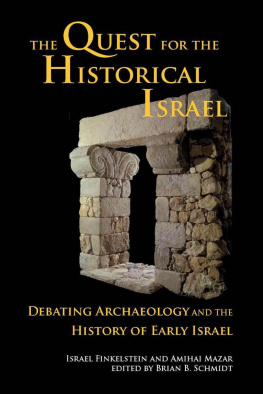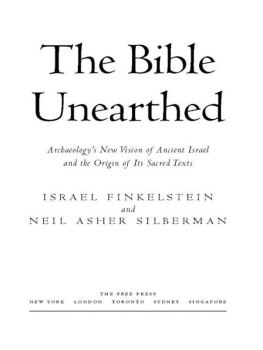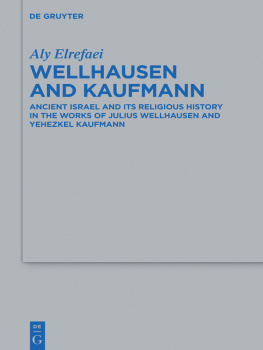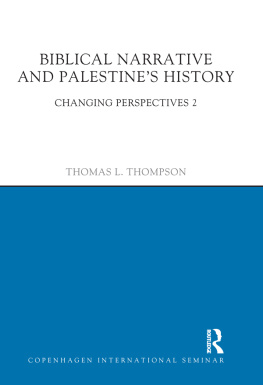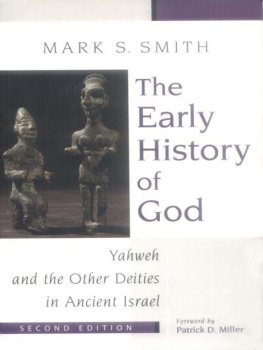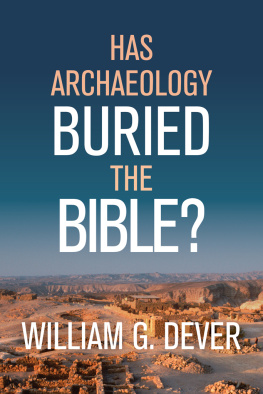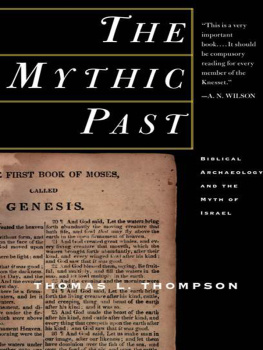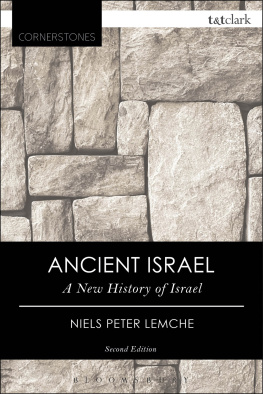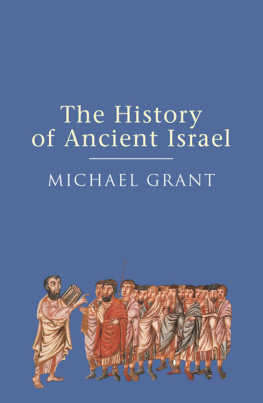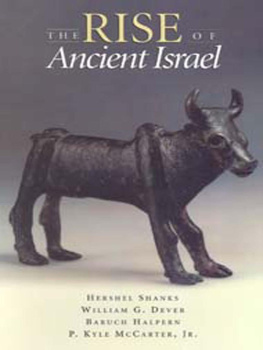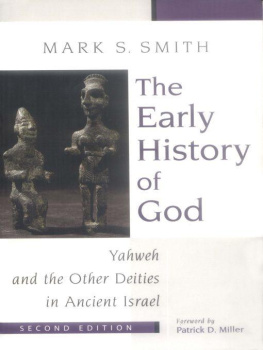Andrew G. Vaughn, Editor
THE QUEST FOR THE HISTORICAL ISRAEL
Debating Archaeology and the History of Early Israel
Invited Lectures Delivered at the Sixth Biennial colloquium of the International Institute for Secular Humanistic Judaism, Detroit, October 2005
by
Israel Finkelstein and Amihai Mazar
edited by
Brian B. Schmidt
Society of Biblical Literature
Atlanta
THE QUEST FOR THE HISTORICAL ISRAEL
Debating Archaeology and the History of Early Israel
Copyright 2007 by the Society of Biblical Literature
All rights reserved. No part of this work may be reproduced or transmitted in any form or by any means, electronic or mechanical, including photocopying and recording, or by means of any information storage or retrieval system, except as may be expressly permitted by the 1976 Copyright Act or in writing from the publisher. Requests for permission should be addressed in writing to the Rights and Permissions Office, Society of Biblical Literature, 825 Houston Mill Road, Atlanta, GA 30329 USA.
Library of Congress Cataloging-in-Publication Data
Finkelstein, Israel.
The quest for the historical Israel : debating archaeology and the history of early Israel : lectures delivered at the Annual Colloquium of the Institute for Secular Humanistic Judaism, Detroit, October 2005 / by Israel Finkelstein and Amihai Mazar ; edited by Brian B. Schmidt.
p. cm. (Society of Biblical Literature Archaeology and Biblical Studies ; 17)
Includes bibliographical references and index.
ISBN 978-1-58983-277-0 (paper binding : alk. paper)
1. Bible. O.T.AntiquitiesCongresses. 2. Bible. O.T.Criticism, interpretation, etc.Congresses. 3. Bible O.T.Evidences, authority, etc.Congresses. 4. Excavations (Archaeology)Israel Congresses. 5. IsraelAntiquitiesCongresses. 6. Archaeology and religionCongresses. I. Mazar, Amihay, 1942- II. Schmidt, Brian B. III. International Institute for Secular Humanistic Judaism. Colloquium (Detroit : 2005) IV. Title.
BS621.F567 2007b
221.95dc22
2007010913
Printed in the United States of America on acid-free, recycled paper conforming to ANSI/NISO Z39.48-1992 (R1997) and ISO 9706:1994 standards for paper permanence.

ISBN 978-1-58983-673-0 (electronic)
CONTENTS
A Summary Assessment for Part 1
Brian B. Schmidt
Digging for the Truth: Archaeology and the Bible
Israel Finkelstein
On Archaeology, Biblical History, and Biblical Archaeology
Amihai Mazar
A Summary Assessment for Part 2
Brian B. Schmidt
Patriarchs, Exodus, Conquest: Fact or Fiction?
Israel Finkelstein
The Patriarchs, Exodus, and Conquest Narratives in Light of Archaeology
Amihai Mazar
A Summary Assessment for Part 3
Brian B. Schmidt
When and How Did the Israelites Emerge?
Israel Finkelstein
The Israelite Settlement
Amihai Mazar
A Summary Assessment for Part 4
Brian B. Schmidt
King Solomons Golden Age?: History or Myth?
Israel Finkelstein
The Search for David and Solomon: An Archaeological Perspective
Amihai Mazar
A Summary Assessment for Part 5
Brian B. Schmidt
The Two Kingdoms: Israel and Judah
Israel Finkelstein
The Divided Monarchy: Comments on Some Archaeological Issues
Amihai Mazar
A Short Summary: Bible and Archaeology
Israel Finkelstein
Concluding Summary: Archaeologys Message
Amihai Mazar
LIST OF FIGURES AND TABLES
PREFACE
This book contains the papers that were delivered at an important event. That event was the Sixth Biennial Colloquium of the International Institute for Secular Humanistic Judaism in Detroit. The Institute is the intellectual arm of the worldwide movement of Secular Humanistic Judaism.
Humanistic Judaism depends on science for the story of the Jewish people. With regard to the early history of the Jews it depends on archaeology. It was our great desire to bring together two of the most famous Israeli archaeologists to thrill our audience with the revelation of their recent discoveries. We were not looking for final answers to our questions. We were looking for believable answers.
With the help of Professor Brian Schmidt of the University of Michigan, we were able to bring together Israel Finkelstein and Amihai Mazar to dialogue before an English-speaking lay audience for the first time. The results of the 2005 colloquium lectures entitled Digging for Truth were spectacular. This book is the consequence of a quite wonderful weekend.
Sherwin T. Wine, Provost
International Institute for Secular Humanistic Judaism
NOTE FROM THE AUTHORS AND EDITOR
Rabbi Sherwin Wine was tragically killed on July 21, 2007 in an automobile accident while in Essaouira, Morocco, just as this volume was approaching the final stages of preparation for publication. We, the authors and editor, dedicate this volume to his lasting memory. Neither these essays, nor the Colloquium in which this book has its roots, would have seen the light of day without his tremendous support and unwavering encouragement.

INTRODUCTION
Brian B. Schmidt
S everal factors made the lectures presented by Professors Israel Finkelstein and Amihai Mazar, and their publication here, a reality. First was the urgent need for new syntheses of Israels early history. Second was the exceptional opportunity to convey the current state of affairs within the field of early Israelite history to an informed and highly receptive public as well as to fellow historians, and to do so from what is self described herein as two centrist perspectives. Third was Rabbi Sherwin Wines invitation to propose a theme topic for the Biennial Colloquium sponsored by the International Institute for Secular Humanistic Judaism of Detroit. Fourth was the immediate interest expressed by Professors Finkelstein and Mazar in serving as the 2005 Colloquium plenary speakers. Last, but by no means least, were the many months of unswerving support, both leading up to and following the event, freely offered by the members of the colloquium organizing committee.
The timing of the presentation and publication of these lectures by two of the leading archaeologists of the southern Levant could not be more opportune. These lectures follow three decades of dialogue, discussion, and debate within the interrelated disciplines of Syro-Palestinian archaeology, Israelite history, and Hebrew Bible. As each of these fields enters a period of synthesis and re-articulation, even renewed cross-fertilization, following an elongated phase of reassessment and, at times, polarization, a balanced articulation of the issues and their resolution has become a desideratum. The occasional extremist tendencies of recent yearswhether of a radical minimalist or of a radical maximalist orientationare here complemented by alternative historical reconstructions emanating from a re-emergent, yet transformed, perspective. The essays contained here represent two moderating perspectives and have as their common ground the position that the material cultural data, the biblical traditions, and ancient Near Eastern written sources are all significantly relevant to the historical quest for ancient Israel of the Iron age (if not earlier). Yet, our authors articulate distinct views of Israelite history. Each gives different weight to these three lines of evidence as they bear on the interpretation and historical relevance of a particular epoch, event, or person of the past.

